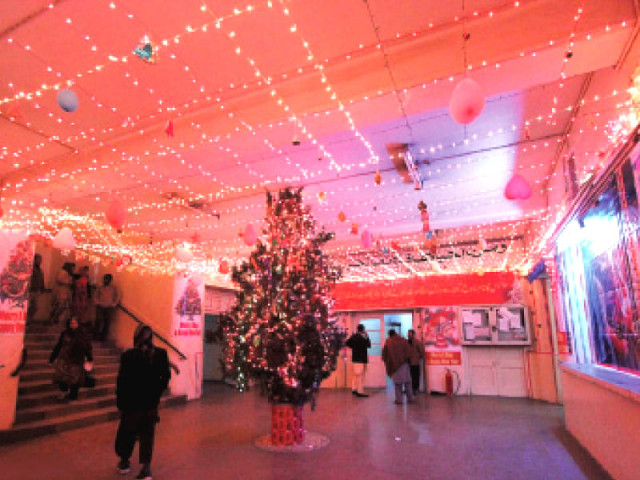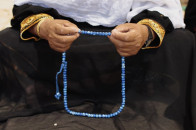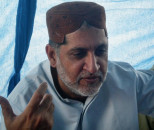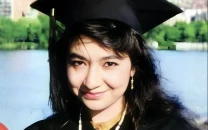‘Making life possible is an art perfected by Christians’
The affluent whether Muslims or Christians, just don’t care: Amin Gulzar.

Holy Family Hospital decorated in connection with Christmas celebrations. PHOTO: ONLINE
With the exclusion of areas like Esa Nagri and Christian Colony, the scenario of ghettos and katchi abadis in Rawalpindi dramatically highlights the difficulties being faced by the less fortunate Christians living there. To add to the abysmal housing facilities, as a legacy of the caste system, a majority of the Christians have the worst jobs — sanitation work.
Highlighting the difficulties facing underprivileged Christians, Nasir Masih said, “If one wants to know what life is like for Christians here and how they are treated, you had better visit the katchi abadis, where residents are dismally sheltered and live in grimy conditions. Making life possible is an art perfected by us - the squatter settlers.”
“The affluent ones like to think of the typical home as greenery-clad building, with roses growing on fences, and trees and grass in the yard and with all this we associate the pleasing and lively sounds of healthy children at play. It is one of the black spots of this city that so many of our homes are not of that kind — or, at least, equally attractive,” laments Amin Gulzar, a resident of katchi abadi.
“I’m not blaming anyone, the government or the majority class, rather I must admit frankly there are rifts within the Christian community as well. The affluent ones in our community don’t care for the poor segments just like the overall Pakistani society,” adds Nasir.
Babu Sajid Amin Khokhar, Catechist Incharge of the Holy Family Catholic Church, doesn’t agree with the statement of Nasir. “It’s never easy for even Muslims having their voice heard as a citizen. The simple fact is that we Christians are no exception in this regard,” he says. However, he complained that last year power and gas load shedding affected X-mas festivities. I hope this year we will have uninterrupted power and gas supply.
“My jurisdiction is spread over Satellite Town, Mohallah Raja Sultan, Gulshan Colonies, Sanaullah Town, Butt Colony, Khayaban-e-Sir Syed, New Katarian, New Paghwari and New Parian. Being part and parcel of the Pakistani society we are confronted with the same problems the non-Christian communities are facing here,” remarked Khokhar.

Talking about how they manage funds for various activities, he said, “We set up a tree in the church with many branches and paper chits are glued or hung onto those branches listing the different essential commodities of daily use such as cooking oil, ghee, atta, rice, pulses, etc. required to help the poor. In this manner, the rich segments make donations to prepare gift packages for the disadvantaged.”
“As far as killings and deprivation is concerned, both Muslims and Christians are alike. If they have been beaten and there have been reports of churches being attacked in various parts of the country, even mosques and Imambargahs have not been spared. As to other excesses against us, we are on the same page with other communities,” says Nazir Masih, responding to a question.
Speaking about the unfortunate name-calling and hurting of religious sentiments, Nazir said, “We simply hope and pray that the tolerance of ordinary people prevails over the zeal and bigotry of the hardliners.”
He added, “In the eyes of some sections of public and religious leaders, the Christians maybe very much second class citizens, but our relations with ordinary Muslims are fine. Still there’s always a worry about what the fundamentalists might do. That’s why we prefer to keep a low profile.”
Listing the katchi abadis in the twin cities, Amanat Masih said, “Pindi has almost 10 katchi abadis mostly inhabited by Christians but Islamabad, the beautiful, has many like Khansa Colony G-8/1, J. Salik Colony Karachi Company near Jilani Chowk, Faisal Colony (once called Tumbu Colony) Sitata Market G-7 Markaz, Muslim Colony G-7/4 at the back side of ZTBL, French Colony F-7 Markaz, and colonies near F-6 Markaz and Lok Virsa. Don’t they pose threat to the health of both the residents and the city, but who cares?”
Apart from what you read and see in the media, he added, I am especially concerned over the discriminatory treatment meted out to us in the constitution debarring Christian community members rising to the top slots like president, prime minister etc.
Adding to the discussion, Safrdar Gill said, This is a sad reality despite the fact that our community members have rendered valuable service in various walks of life.
“How long will it take to treat us as equal citizens,” he questioned.
Published in The Express Tribune, December 25th, 2012.



















COMMENTS
Comments are moderated and generally will be posted if they are on-topic and not abusive.
For more information, please see our Comments FAQ